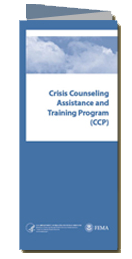Crisis Counseling Assistance and Training Program
The Federal Emergency Management Agency (FEMA) implements the Crisis Counseling Assistance and Training Program (CCP) as a supplemental assistance program available to the United States and its Territories. Section 416 of the Robert T. Stafford Disaster Relief and Emergency Assistance Act, 1974 authorizes FEMA to fund mental health assistance and training activities in Presidentially declared major disaster areas. The Substance Abuse and Mental Health Services Administration's (SAMHSA) Center for Mental Health Services (CMHS) - Emergency Mental Health and Traumatic Stress Services Branch (EMHTSSB) works with FEMA through an interagency agreement to provide technical assistance, consultation, and training for State and local mental health personnel, grant administration and program oversight.
Program Overview
The mission of the CCP is to assist individuals and communities in recovering from the effects of natural and human-caused disasters through the provision of community-based outreach and psycho-educational services. Three entities are eligible to apply for and receive CCP funding after a Presidential disaster declaration: States, U.S. Territories, and federally recognized Tribes. The CCP supports short-term interventions that involve the counseling goals of assisting disaster survivors in understanding their current situation and reactions, mitigating stress, assisting survivors in reviewing their disaster recovery options, promoting the use or development of coping strategies, providing emotional support, and encouraging linkages with other individuals and agencies who may help survivors in their recovery process.
Supplemental funding for crisis counseling is available to State or Territory Mental Health Authorities through two grant mechanisms: (1) the Immediate Services Program (ISP) which provides funds for up to 60 days of services immediately following a disaster declaration; and (2) the Regular Services Program (RSP) which provides funds for up to nine months following a disaster declaration. While SAMHSA provides technical assistance for an ISP, the monitoring responsibility remains with FEMA. FEMA has designated SAMHSA as the authority responsible for monitoring all RSP programs.
Key Principles
The CCP is guided by the following key principles. It is:
- Strengths Based—CCP services promote resilience, empowerment, and recovery.
- Anonymous—Crisis counselors do not classify, label, or diagnose people; no records or case files are kept.
- Outreach Oriented—Crisis counselors deliver services in the communities rather than wait for survivors to seek their assistance.
- Conducted in Nontraditional Settings—Crisis counselors make contact in homes and communities, not in clinical or office settings.
- Designed to Strengthen Existing Community Support Systems—The CCP supplements, but does not supplant or replace, existing community systems.
CCP Application Toolkit
The CCP Application Toolkit (version 3.3) contains guidance and application information. This information can be viewed as html or downloaded as a .zip file.
Please contact the SAMHSA Disaster Technical Assistance Center (DTAC) at 1-800-308-3515 or visit our online contact form. DTAC will provide consultation or connect you with your assigned CMHS or FEMA Project Officer.
DTAC Quick Links
- FacebookExternal link. Please review our Disclaimer
- FlickrExternal link. Please review our Disclaimer
- RSS FeedsExternal link. Please review our Disclaimer
- SAMHSA BlogExternal link. Please review our Disclaimer
- TwitterExternal link. Please review our Disclaimer
- YoutubeExternal link. Please review our Disclaimer

View a PDF version of the CCP brochure. [PDF-226 Kb]




